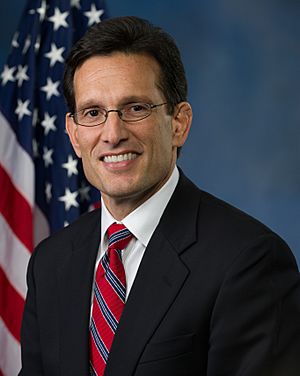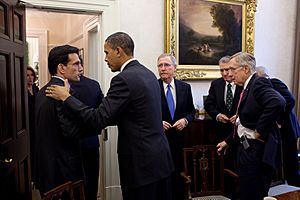Eric Cantor facts for kids
Quick facts for kids
Eric Cantor
|
|
|---|---|

Official portrait, 2012
|
|
| House Majority Leader | |
| In office January 3, 2011 – August 1, 2014 |
|
| Speaker | John Boehner |
| Preceded by | Steny Hoyer |
| Succeeded by | Kevin McCarthy |
| House Minority Whip | |
| In office January 3, 2009 – January 3, 2011 |
|
| Leader | John Boehner |
| Preceded by | Roy Blunt |
| Succeeded by | Steny Hoyer |
| House Republican Chief Deputy Whip | |
| In office January 3, 2003 – January 3, 2009 |
|
| Appointed by | Roy Blunt |
| Leader | Dennis Hastert |
| Preceded by | Roy Blunt |
| Succeeded by | Kevin McCarthy |
| Member of the U.S. House of Representatives from Virginia's 7th district |
|
| In office January 3, 2001 – August 18, 2014 |
|
| Preceded by | Thomas J. Bliley Jr. |
| Succeeded by | Dave Brat |
| Member of the Virginia House of Delegates from the 73rd district |
|
| In office January 8, 1992 – January 3, 2001 |
|
| Preceded by | Walter Stosch |
| Succeeded by | John O'Bannon |
| Personal details | |
| Born |
Eric Ivan Cantor
June 6, 1963 Richmond, Virginia, U.S. |
| Political party | Republican |
| Spouse |
Diana Fine
(m. 1989) |
| Children | 3 |
| Education | George Washington University (BA) College of William and Mary (JD) Columbia University (MS) |
Eric Ivan Cantor (born June 6, 1963) is an American politician and lawyer. He was a U.S. representative for Virginia's 7th congressional district from 2001 to 2014. A member of the Republican Party, he held important leadership roles. He was the House Minority Whip from 2009 to 2011 and the House Majority Leader from 2011 to 2014.
Before serving in the U.S. Congress, Cantor was a member of the Virginia House of Delegates from 1992 to 2001. His district in Congress included parts of Richmond and its suburbs.
In June 2014, Cantor lost the Republican primary election to a college professor named Dave Brat. This was a huge surprise to political experts. After the loss, Cantor resigned as House Majority Leader. A few weeks later, he resigned from Congress on August 18, 2014. He then took a job as vice chairman at the investment bank Moelis & Company. When he left Congress, Cantor was the highest-ranking Jewish member in its history.
Contents
Early Life and Education
Eric Cantor was born in Richmond, Virginia. He was the second of three children. His mother, Mary Lee, was a schoolteacher, and his father, Eddie, owned a real estate company. His family came to the United States from Russia, Romania, and Latvia in the late 1800s and early 1900s.
Cantor graduated from a private school in Richmond in 1981. He went to George Washington University. As a student, he worked as an intern for Virginia Congressman Tom Bliley. Cantor earned his first degree in 1985. He then got a law degree from William & Mary Law School in 1988. In 1989, he received a master's degree from Columbia University.
Before he was elected to Congress, Cantor worked for his family's real estate business.
Political Career
Virginia House of Delegates
Cantor's political career began in 1992 in the Virginia House of Delegates, which is part of Virginia's state government. He served there until 2001. In 2000, he decided to run for a seat in the United States House of Representatives. He won the Republican primary election by a very small number of votes, only 263.
U.S. House of Representatives
Cantor became a U.S. Representative in 2001. During his first term, he was the chairman of a special group that studied terrorism. He also served on important committees that dealt with money and foreign relations.
Leadership Roles
In 2002, Cantor was chosen to be the Chief Deputy Republican Whip. This was a high-level job in his party. The whip's job is to make sure party members are present for important votes and vote the way the party leadership wants.

In 2008, he was elected Republican Whip, the second-most powerful position for a Republican in the House at the time. When Republicans won control of the House in the 2010 elections, Cantor became the majority leader. This meant he was in charge of scheduling bills for votes on the House floor.
Cantor was a top fundraiser for the Republican Party. He was also a founding member of the GOP Young Guns Program, which helped new conservative candidates get elected. In 2010, he co-wrote a bestselling book called Young Guns: A New Generation of Conservative Leaders.
Legislation
Cantor was a big supporter of the Gabriella Miller Kids First Research Act. This law directs money from a fund for presidential elections to be used for research on childhood cancer. The law provides $126 million over 10 years for the National Institutes of Health to study these diseases.
Political Views
For most of his time in Congress, Cantor was the only Jewish Republican. He was a strong supporter of the relationship between the United States and Israel.
Economy
Cantor supported free trade, which is a policy that encourages trade between countries with few government restrictions. He voted for trade agreements with countries like Peru, Chile, and Australia. He also supported the Central America Free Trade Agreement (CAFTA).
In 2008, Cantor voted for the TARP program. This was a government plan to help banks that were in financial trouble. However, in 2009, he voted against the American Recovery and Reinvestment Act of 2009, a bill designed to boost the economy.
Cantor helped pass the STOCK Act in 2012. This law requires members of Congress to be more open about their investments in the stock market. He also helped pass the JOBS Act, which was designed to help small businesses and startups grow.
Political Campaigns
Cantor represented Virginia's 7th congressional district. This district has usually elected Republican candidates.
- 1991-1999: Cantor was first elected to the Virginia House of Delegates in 1991. He was re-elected four times, often without anyone running against him.
- 2000: He was first elected to the U.S. House of Representatives. He won the Republican primary by only 263 votes.
- 2002-2012: Cantor was re-elected to Congress six times. In most of these elections, he won by a large margin.
- 2014: In a major surprise, Cantor lost the Republican primary election to Dave Brat, a college professor supported by the Tea Party movement. Cantor was the first sitting House majority leader to ever lose a primary election.
2014 Primary Loss and Resignation
Cantor's loss in 2014 shocked many people. Experts believe several things led to his defeat. Some voters felt he was not connected to his district anymore. Also, fewer people than expected turned out to vote in the primary.
After losing, Cantor announced he would step down as House Majority Leader. He then announced he would resign from Congress entirely on August 18, 2014. The governor of Virginia called for a special election to fill his seat.
A few weeks after leaving Congress, Cantor was hired by the advisory firm Moelis & Company as a vice chairman and managing director.
Personal Life
Cantor married Diana Fine in 1989. They have three children: Evan, Jenna, and Michael.
Diana Cantor is a lawyer and accountant. She has worked as a managing director at a bank. She also helped start and run the Virginia College Savings Plan, a state agency that helps families save for college.
See also
 In Spanish: Eric Cantor para niños
In Spanish: Eric Cantor para niños
- List of Jewish members of the United States Congress
 | Percy Lavon Julian |
 | Katherine Johnson |
 | George Washington Carver |
 | Annie Easley |

